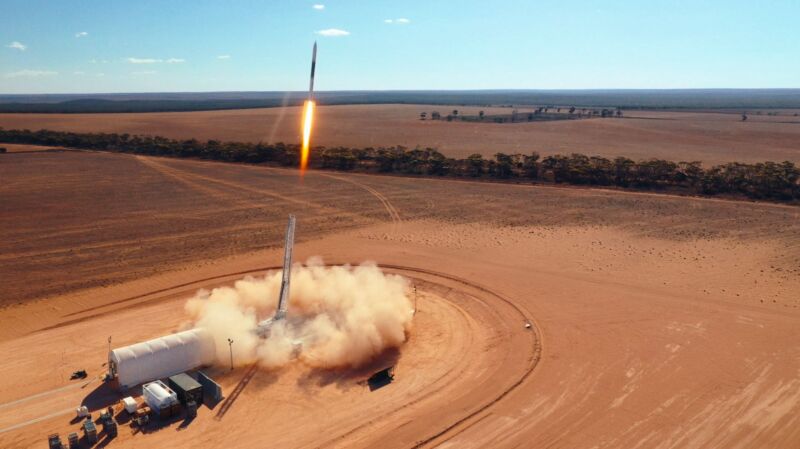
Enlarge / HyImpulse’s single-stage rocket, SR75, lifts off from Australia.
HyImpulse
Welcome to Edition 6.43 of the Rocket Report! This week saw the debut of two new rockets, a suborbital lifter from a German startup, and a new variant of the Long March 6 from China’s state-owned launch provider. We also got within two hours of the debut of a crewed launch of Boeing’s Starliner vehicle, but a rocket issue forced a 10-day delay. Soon, hopefully.
As always, we welcome reader submissions, and if you don’t want to miss an issue, please subscribe using the box below (the form will not appear on AMP-enabled versions of the site). Each report will include information on small-, medium-, and heavy-lift rockets as well as a quick look ahead at the next three launches on the calendar.

Orbital launch tally running ahead of 2023. There were 63 orbital launch attempts worldwide in the first quarter of 2024, which is 10 more than the same time last year, Payload reports. SpaceX accounted for 32 of the 34 US orbital launch attempts in Q1. One ULA Vulcan launch and one Rocket Lab Electron launch out of Wallops rounded out the remaining total. (Rocket Lab flights out of New Zealand are not counted in US launch totals.)
SpaceX accounts for more than half … SpaceX flew 31 Falcon missions and one Starship mission in Q1. The company’s launch attempts increased by 11 flights in Q1 2024 vs. Q1 2023. China’s Q1 launch was flat year over year at 14 flights, with its Long March 2 vehicle leading the way with four missions. Europe’s planned summer Ariane 6 launch can’t come soon enough, as the region saw zero launch attempts in the quarter.
Virgin Galactic will lean heavily on mothership. Virgin Galactic says it will fly its existing “mothership” aircraft more frequently than previously planned with its upcoming Delta-class suborbital spaceplanes, allowing the company to defer development of a new plane, Space News reports. In a May 7 earnings call, Virgin Galactic executives said they expect to fly their VMS Eve aircraft up to 125 times a year once the company starts commercial service of the Delta spaceplanes, the successor to the existing VSS Unity, in 2026.
Asking a lot of Eve … “The planned increase in flight cadence for our mothership Eve is a game changer when our first two Delta ships enter commercial service,” added Doug Ahrens, chief financial officer of Virgin Galactic. That is a lot to ask of what was originally a developmental aircraft, which started flights in 2008. Eve was never intended to fly this many times, and it seems likely that refurbishment of the plane between launches could become a major bottleneck for Virgin Galactic as it seeks to scale up operations. (submitted by Ken the Bin)
The easiest way to keep up with Eric Berger’s space reporting is to sign up for his newsletter, we’ll collect his stories in your inbox.
HyImpulse conducts its first launch. The Germany-based startup launched a suborbital rocket from Southern Launch’s Koonibba Test Range in Australia late last week. The SR75 rocket’s “Light this Candle!” mission was the inaugural launch attempt of HyImpulse’s booster, a pathfinder for an eventual orbital rocket. In a news release, the company characterized the flight as a “success” but did not specify what altitude the vehicle reached. Nominally, it is capable of flying to 250 km.
Literally lighting a candle … “With this successful launch, which also provides us with valuable data for further development, we have validated our technical concept and demonstrated our market readiness,” said Christian Schmierer, co-founder and co-CEO of HyImpulse. The German launch company is developing its rockets with hybrid technology, using solid paraffin (commonly known as candle wax) and liquid oxygen as fuel. HyImpulse aims to learn from this launch as it develops the SL1 multi-stage orbital launch vehicle, which may debut next year. (submitted by Marakai and Joey S-IVB)